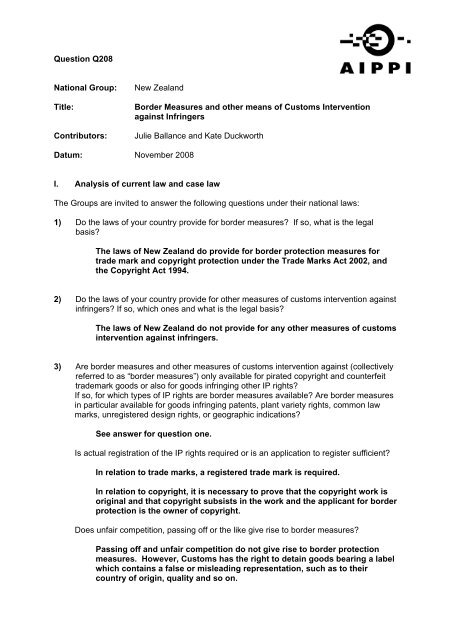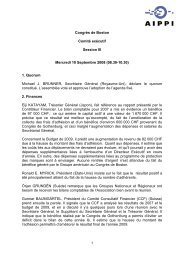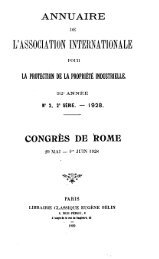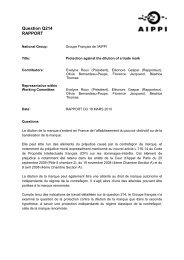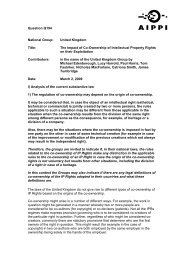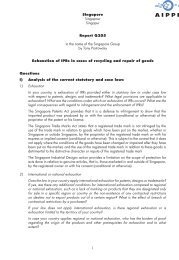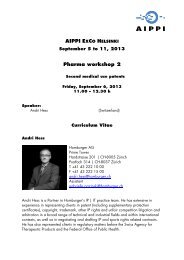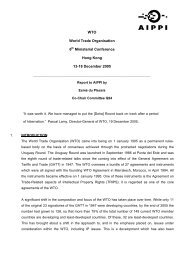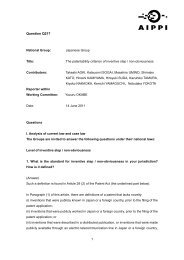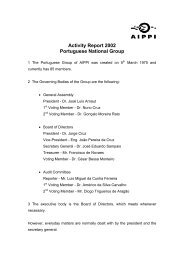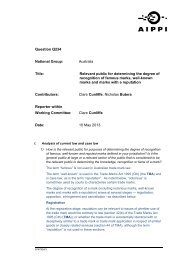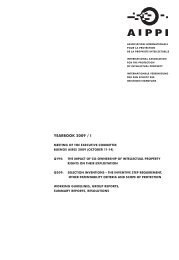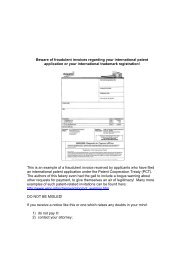Question Q208 National Group: New Zealand Title: Border ... - AIPPI
Question Q208 National Group: New Zealand Title: Border ... - AIPPI
Question Q208 National Group: New Zealand Title: Border ... - AIPPI
Create successful ePaper yourself
Turn your PDF publications into a flip-book with our unique Google optimized e-Paper software.
<strong>Question</strong> <strong>Q208</strong><br />
<strong>National</strong> <strong>Group</strong>:<br />
<strong>Title</strong>:<br />
Contributors:<br />
<strong>New</strong> <strong>Zealand</strong><br />
<strong>Border</strong> Measures and other means of Customs Intervention<br />
against Infringers<br />
Julie Ballance and Kate Duckworth<br />
Datum: November 2008<br />
I. Analysis of current law and case law<br />
The <strong>Group</strong>s are invited to answer the following questions under their national laws:<br />
1) Do the laws of your country provide for border measures? If so, what is the legal<br />
basis?<br />
The laws of <strong>New</strong> <strong>Zealand</strong> do provide for border protection measures for<br />
trade mark and copyright protection under the Trade Marks Act 2002, and<br />
the Copyright Act 1994.<br />
2) Do the laws of your country provide for other measures of customs intervention against<br />
infringers? If so, which ones and what is the legal basis?<br />
The laws of <strong>New</strong> <strong>Zealand</strong> do not provide for any other measures of customs<br />
intervention against infringers.<br />
3) Are border measures and other measures of customs intervention against (collectively<br />
referred to as “border measures”) only available for pirated copyright and counterfeit<br />
trademark goods or also for goods infringing other IP rights?<br />
If so, for which types of IP rights are border measures available? Are border measures<br />
in particular available for goods infringing patents, plant variety rights, common law<br />
marks, unregistered design rights, or geographic indications?<br />
See answer for question one.<br />
Is actual registration of the IP rights required or is an application to register sufficient?<br />
In relation to trade marks, a registered trade mark is required.<br />
In relation to copyright, it is necessary to prove that the copyright work is<br />
original and that copyright subsists in the work and the applicant for border<br />
protection is the owner of copyright.<br />
Does unfair competition, passing off or the like give rise to border measures?<br />
Passing off and unfair competition do not give rise to border protection<br />
measures. However, Customs has the right to detain goods bearing a label<br />
which contains a false or misleading representation, such as to their<br />
country of origin, quality and so on.
- 2 -<br />
4) Are border measures available for parallel imported goods?<br />
No, border protection measures are not available for parallel imported<br />
goods.<br />
Are border measures available for goods contained in a travellers’ private luggage?<br />
<strong>New</strong> <strong>Zealand</strong> Customs has the power to inspect travellers’ private luggage<br />
if they have reasonable cause to suspect they are carrying prohibited<br />
goods. However, customs notices can not be enforced against goods<br />
which are for private and domestic use.<br />
Are there any other goods excluded by your border measures legislation?<br />
5) Who is entitled to file an application for customs action?<br />
A Customs notice can be filed by:<br />
• the owner of a registered trade mark (under the Trade Marks Act 2002);<br />
or<br />
• the owner of a copyright work (under the Copyright Act 1994 or the<br />
Designs Act 1953).<br />
Is there a centralised system for managing multiple applications for customs action<br />
through a single contact point?<br />
Yes, the system is managed by the <strong>New</strong> <strong>Zealand</strong> Customs Service.<br />
What are the conditions for border measures? In particular, what level of evidence for<br />
alleged infringement and other information is required by customs authorities regarding<br />
the application for customs action?<br />
The <strong>New</strong> <strong>Zealand</strong> Customs Service has the power to inspect all<br />
importations for counterfeit or pirated goods. The <strong>New</strong> <strong>Zealand</strong> Customs<br />
Service inspects approximately 10% of goods. If it identifies goods that it<br />
suspects are pirated or counterfeit, it notifies the holder of the trade mark<br />
or copyright notice and it is up to the holder to take legal action, otherwise<br />
Customs releases the goods.<br />
To which extent are customs authorities willing to receive training by the right holder?<br />
In our experience Customs agents freely contact us to discuss whether<br />
goods they have inspected are counterfeit or pirated and freely pass on<br />
details about the goods to enable us, as the agents of the rights holder, to<br />
confirm with the rights holder whether the goods do in fact breach their<br />
intellectual property rights.<br />
Do customs authorities generally require the provision of a security to protect the<br />
owner, holder or importer of the allegedly infringing goods? If so, will such security<br />
depend on the type of IP rights?<br />
Customs requires that a security (bond), usually NZ$5,000, be deposited<br />
with it to cover costs. A security notice addressed to Customs must<br />
accompany this payment.<br />
2
- 3 -<br />
The security accompanies the first trade mark or copyright notice lodged.<br />
No additional security is required for further notices of the same type.<br />
This security is paid into an interest bearing trust account and may be<br />
drawn on should Customs incur costs as a result of detaining goods on the<br />
rights holders behalf. These may include storage, transportation,<br />
destruction and legal costs arising from action by the importer. Customs,<br />
however, does not charge for its time. The balance is refunded if the<br />
Customs notice lapses.<br />
May the customs authorities take ex officio measures? If so, what is the practical<br />
relevance of ex officio action in your country? Are customs authorities liable in case of<br />
wrongful ex officio detention?<br />
<strong>New</strong> <strong>Zealand</strong> Customs cannot take ex officio measures in relation to<br />
possible infringement of intellectual property rights.<br />
6) Are customs authorities properly equipped to identify goods which infringe patents,<br />
plant variety rights, common law marks, unregistered design rights, geographic<br />
indications or the like?<br />
<strong>New</strong> <strong>Zealand</strong> laws do not provide border protection for the importation of<br />
goods which infringe patents, plant variety rights, common law marks,<br />
unregistered designs or geographic indications. Therefore, there is no<br />
need for Customs to be equipped in dealing with infringement of these<br />
types of intellectual property rights.<br />
7) Is only the right-holder or also the owner, holder or importer of the allegedly infringing<br />
goods notified once the customs authorities detain goods? How can the alleged<br />
infringer obtain information about the status of border measures and what information<br />
is provided by customs authorities to the alleged infringer?<br />
If the goods appear to be counterfeit, Customs will detain the goods and<br />
issue a ‘Notice of Determination’ to the importer and to the rights holder<br />
address for service, ordinarily this will be the rights holder’s patent attorney<br />
or lawyer and any other person who appears to have an interest in the<br />
goods.<br />
A determination in respect of a trade mark or copyright work is<br />
accompanied by a letter from Customs to the importer inviting them to<br />
forfeit the goods under the relevant section of the Trade Marks Act or<br />
Copyright Act.<br />
In relation to trade marks and copyright, any person who claims to have an<br />
interest in the goods which are the subject of a Notice of Determination,<br />
may inspect the goods.<br />
8) What happens after notification? Briefly describe the procedure following notification.<br />
Is the inspection of the allegedly infringing goods following notification usually carried<br />
out by the right holder or by an expert? Does your border measures legislation provide<br />
for a simplified procedure allowing the destruction of the goods without there being any<br />
need to determine whether IP rights have been infringed? If so, in which cases? Are<br />
samples of the goods preserved for evidence purposes?<br />
3
- 4 -<br />
Customs can only detain the goods for 10 business days from the date the<br />
determination issued, after which it must release them to the importer.<br />
There are two exceptions to this.<br />
The first exception is where the importer, within the 10 days, agrees to<br />
forfeit the goods to the Crown. If forfeited, the goods are usually destroyed.<br />
The second exception is where court proceedings are commenced against<br />
the importer within the 10 day period. In that instance, Customs will detain<br />
the goods until the proceedings are resolved.<br />
In our experience once the Notice of Determination is issued, the allegedly<br />
infringing goods are not inspected by the rights holder or an expert.<br />
If proceedings must be issued to determine whether the goods infringe IP rights, are<br />
both civil and criminal proceedings available to determine infringement? What are the<br />
advantages and disadvantages of the respective proceedings?<br />
In <strong>New</strong> <strong>Zealand</strong>, trade mark and copyright law provide for criminal offences<br />
against the importation of counterfeit and pirated goods, as well as civil<br />
proceedings to determine infringement.<br />
Trade Mark – Criminal<br />
In relation to trade marks, it is an offence to import into <strong>New</strong> <strong>Zealand</strong> for the<br />
purpose of trade or manufacture any goods to which that person knows a<br />
registered trade mark is falsely applied. Like many criminal offence, the<br />
requisite mental element of “knowledge” is required.<br />
The penalties available for a person convicted of the above offence,<br />
includes:<br />
• A fine not exceeding $150,000; or<br />
• Imprisonment for a term not exceeding 5 years.<br />
Copyright – Criminal<br />
In relation to copyright, it is an offence to import into <strong>New</strong> <strong>Zealand</strong>,<br />
otherwise than for personal use and domestic use, an object that is, and<br />
that the person knows is, an infringing copy of a copyright work.<br />
The penalties availble for a person convicted of the above offence,<br />
includes:<br />
• A fine not exceeding $10,000 for every infringing copy to which the<br />
offence relates, but not exceeding $150,000 in respect of the same<br />
transaction; or<br />
• Imprisonment for a term not exceeding 5 years.<br />
In relation to civil proceedings, the onus is on the rights holder to intiate<br />
infringement proceedings. In this sense the rights holder is in control of<br />
whether infringement proceedings are commence.<br />
In relation to criminal proceedings, the onus is on the Police, as agents of<br />
the Crown, to initiate criminal proceedings. It is hard to get the Police to<br />
take interest in these types of cases and consequently not many criminal<br />
actions have been taken.<br />
4
- 5 -<br />
What is the impact of a nullity action seeking to invalidate IP rights on the application<br />
for customs action?<br />
May customs authorities release goods suspected of infringing IP rights on provision of<br />
a security by the owner, holder or importer of such goods? If so, will such release<br />
depend on the type of IP rights?<br />
If the rights owner sues the alleged infringer for importing counterfeit<br />
goods, the infringer may counterclaim for invalidity of the IP rights.<br />
Customs will not release the goods until the conclusion of any legal action.<br />
9) If goods are found to infringe IP rights, may a right holder oppose<br />
- exportation of infringing goods from your country;<br />
- infringing goods in transit;<br />
- placement of infringing goods in a free trade zone or free trade warehouse?<br />
` If goods are found to infringe IP rights, do the judicial or customs authorities of your<br />
country generally order the destruction of the goods or do they have the authority to<br />
dispose of the goods outside commercial channels (e.g. to charity)?<br />
May the competent authorities also order the infringer to give the names of his<br />
accomplices, upstream or downstream in the channels of production and distribution?<br />
It is not clear whether the rights holder may oppose exportation of<br />
infringing goods but it is more likely that a rights holder may oppose<br />
infringing goods in transit. Customs will readily detain infringing goods<br />
even if they are only in transit. There is no such thing as a free trade<br />
warehouse in <strong>New</strong> <strong>Zealand</strong>. Customs authorities have the power to dispose<br />
of the goods, usually they are destroyed. We are not aware of any power<br />
which would require the infringer to give names of any accomplices.<br />
10) May judicial or customs authorities order the applicant to pay the owner, holder or<br />
importer of goods appropriate compensation for any injury caused by wrongful<br />
detention? What is considered appropriate compensation and does it include attorney<br />
fees or other expenses?<br />
We are not aware of any such provisions in <strong>New</strong> <strong>Zealand</strong> law.<br />
II.<br />
Proposals for adoption of uniform rules<br />
The <strong>Group</strong>s are invited to put forward proposals for adoption of uniform rules regarding<br />
border measures and other measures of customs intervention against infringers. More<br />
specifically, the <strong>Group</strong>s are invited to answer the following questions:<br />
1) Do you think that the adoption of uniform rules and best practice of customs authorities<br />
in the area of border measures and better coordination between countries and at an<br />
international level are desirable to improve enforcement?<br />
No comment<br />
2) What should the scope of border measures be? Do you think that border measures<br />
should be available also for goods infringing IP rights for which your national law<br />
currently does not provide border measures? If so, which IP rights? Should unfair<br />
5
- 6 -<br />
competition give rise to border measures? Which goods should be excluded by border<br />
measures legislation?<br />
No comment<br />
3) What rules should apply in relation to the lodging and processing of applications for<br />
customs action? Should there be a centralised system for managing multiple<br />
applications for customs action through a single contact point?<br />
Should there be uniform rules on the provision of information by the applicant? What<br />
should the required level of evidence for alleged infringement be?<br />
Should there be uniform rules on the provision of information by the customs<br />
authorities?<br />
No comment<br />
4) What rules should apply in relation to the procedure following notification?<br />
Should there be a simplified procedure allowing the destruction of the goods without<br />
there being any need to determine whether IP rights have been infringed?<br />
Should there be uniform rules on the examination of the goods by the right holder,<br />
security and compensation in the case of wrongful detention of goods and disposal of<br />
infringing goods?<br />
No comment<br />
<strong>National</strong> <strong>Group</strong>s are invited to comment on any additional issue concerning border measures<br />
and other measures of customs intervention which they find relevant.<br />
It will be helpful and appreciated if <strong>Group</strong>s follow the order of the questions in their Reports<br />
and use the questions and numbers for each answer.<br />
Summary: <strong>Question</strong> 208<br />
The laws of <strong>New</strong> <strong>Zealand</strong> do provide for border protection measures for trade mark<br />
and copyright protection under the Trade Marks Act 2002, and the Copyright Act<br />
1994.<br />
In order to enforce border protection measures in relation to trade marks and<br />
copyright, it is necessary to obtain a Customs Notice. In relation to trade marks, a<br />
registered trade mark is required. In relation to copyright, it is necessary to prove that<br />
the copyright work is original and that copyright subsists in the work and the applicant<br />
for border protection is the owner of copyright.<br />
In <strong>New</strong> <strong>Zealand</strong>, trade mark and copyright law provide for criminal offences against<br />
the importation of counterfeit and pirated goods, as well as civil proceedings to<br />
determine infringement.<br />
6


